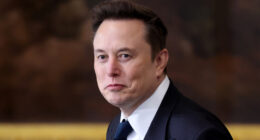
I saw this video on Twitter last week. It shows employees at one of China’s largest tech companies, Tencent, running out of their building after someone inside tested positive for COVID. The employees knew that unless they escape the building very quickly, they will be locked down inside for days.
How not to #antivirus
Video took inside head quarter building of #騰訊. (#Tencent ,a world-wide #Chinese IT company)
Employee was found receive positive result in virus test.
The others was rushing out under the anxiety of lockdown by government.#China #COVID19 #ZeroCovid https://t.co/6CxYS836bD— 過勞死X文香P (@Shimizusoul) August 23, 2022
This sort of thing continues happening in China as Xi Jinping insists on pursuing his zero-COVID policy no matter what the cost. Earlier this month there was a similar scene at an IKEA store in Shanghai.
Ikea furniture store in 🇨🇳 #Shanghai Xujiahui District suddenly announced lockdown after the detection of 1 Covid positive. 300+ shoppers frantically pushed their way out to escape. The remaining shoppers unluckily trapped inside were forced to the quarantine concentration camps. pic.twitter.com/DmUHhUPk4x
— Northrop Gundam ∀ (@GundamNorthrop) August 14, 2022
And it keeps happening. Just today, China’s largest electronics marketplace in Shenzhen was shut down over a handful of positive tests.
Authorities in China’s southern city of Shenzhen shut the world’s largest electronics market of Huaqiangbei and suspended service at 24 subway stations on Monday in a bid to curb an outbreak of Covid-19.
Three key buildings in the sprawling area, comprised of thousands of stalls selling microchips, telephone parts, and other components to manufacturers, will stay closed until Sept 2…
On Monday, the tech hub of nearly 18 million people reported nine symptomatic and two asymptomatic cases from testing the previous day.
Here’s what it looks like up close.
Residents of Shenzhen’s Wanxia urban village watch the plastic walls go up as the urban village enters lockdown, again. They can go in, but won’t be able to leave at least for a few days. None of Shenzhen’s 11 Covid cases detected yesterday live in the village. pic.twitter.com/jgK238wR2k
— David Kirton (@DavidKirton_) August 29, 2022
Shutting down entire businesses or even large cities over a handful of positive test results inevitably does a lot of damage to the economy. That impact is now evident in China’s 2nd quarter results.
Chinese technology giants are coming off the back of their worst quarter of growth in history as a big slowdown in the world’s second-largest economy, stoked by Beijing’s strict Covid policy, takes its toll.
In the second quarter of the year, e-commerce firm Alibaba posted its first ever flat year-on-year quarterly revenue growth and social media and gaming company Tencent reported its first sales decline on record. JD.com, China’s second-largest e-commerce player, posted its slowest revenue growth in history, while electric vehicle maker Xpeng posted a wider-than-expected loss as well as weak guidance…
China’s economy grew just 0.4% in the second quarter, and that impacted the strength of the consumer as well as spending from companies in areas like advertising and cloud computing.
READ RELATED: California’s Ban of Gas-Powered Vehicles Likely Illegal, Unrealistic
It’s not just Chinese companies that are struggling. A survey of large US companies operating in China found that optimism about the future outlook for business has dropped substantially over the past year. Again, this is all connected to China’s zero COVID fixation.
Compared with 10 years ago, confidence among American firms about the five-year outlook has dropped from nearly 90 per cent to just over 50 per cent this year, according to the US-China Business Council (USCBC) survey, which was released in Washington on Monday.
Business optimism dived 18 percentage points compared to last year, and the number of companies that are “pessimistic” has increased from 5 per cent to more than 20 per cent over the past decade…
China’s coronavirus control measures were companies’ top challenge, the survey said, with 96 per cent of respondents negatively affected by Beijing’s zero-Covid policy and more than half delaying or cancelling investments as a result.
Perhaps the most significant sign that things are desperate comes in the form of internal criticism of the Chinese government. The Associated Press reports today that a Chinese think tank is explicitly questioning Xi Jinping’s focus on zero COVID at the expense of growth.
The Anbound Research Center gave no details of possible changes but said President Xi Jinping’s government needs to focus on shoring up sinking growth. It noted the United States, Europe and Japan are recovering economically after easing anti-disease curbs.
“Preventing the risk of economic stall should be the priority task,” the think tank said in a report titled, “It’s Time for China to Adjust Its Virus Control and Prevention Policies.”
Even such mild public disagreement with official policy is almost unknown in a politically sensitive year when Xi, China’s most powerful leader since at least the 1980s, is expected to try to extend his time in office…
“China’s economy is at risk of stalling” due to the “impact of epidemic prevention and control policies,” the think tank said.
People in China disappear and wind up in jail for criticism of Xi Jinping so this is not something done lightly. But of course there is only one opinion that matters in China and there’s no indication that Xi Jinping will be changing course anytime soon. I’ll wrap this up with one more story about zero COVID. This one was published by the South China Morning Post on Saturday.
My daughter and I finally returned home to Beijing on Tuesday, a full 23 days after we had arrived in Hainan for a planned one-week beach holiday and became trapped in a travel nightmare by China’s extreme Covid-19 suppression measures.
For almost a month, we were forced to become nomads – first stranded on the tropical island province, then trapped thousands of kilometres away in Tianjin for a week as we waited to be cleared for our return to the Chinese capital…
The travel ban is apparently aimed at keeping China’s capital virus-free in the run up to the Communist Party’s 20th Congress, reportedly set for October, when Xi is widely expected to seek a norm-busting third term as the party chief in a major leadership shake-up…
From the Chinese government’s perspective, the health code system has worked wonders in controlling both the spread of the virus and the population. It’s hard to imagine the authorities voluntarily giving up such powers, even once the pandemic is over.
So the immediate justification for the zero COVID obsession (preventing an outbreak prior to Xi’s coronation) will be over in a few months. But as the author suggests, it’s hard to imagine an authoritarian government giving up this much control of the population once it has established it.
Update: This is crazy.
I’m not sure who the joke is on, me or the people handing out these lists. I asked the receptionist: “you want me to read this?” And she just started laughing. It’s things like this that undermine the seriousness of zero covid in China. Who can pretend this is a good idea?
— Don Weinland (@donweinland) August 22, 2022
Source:



